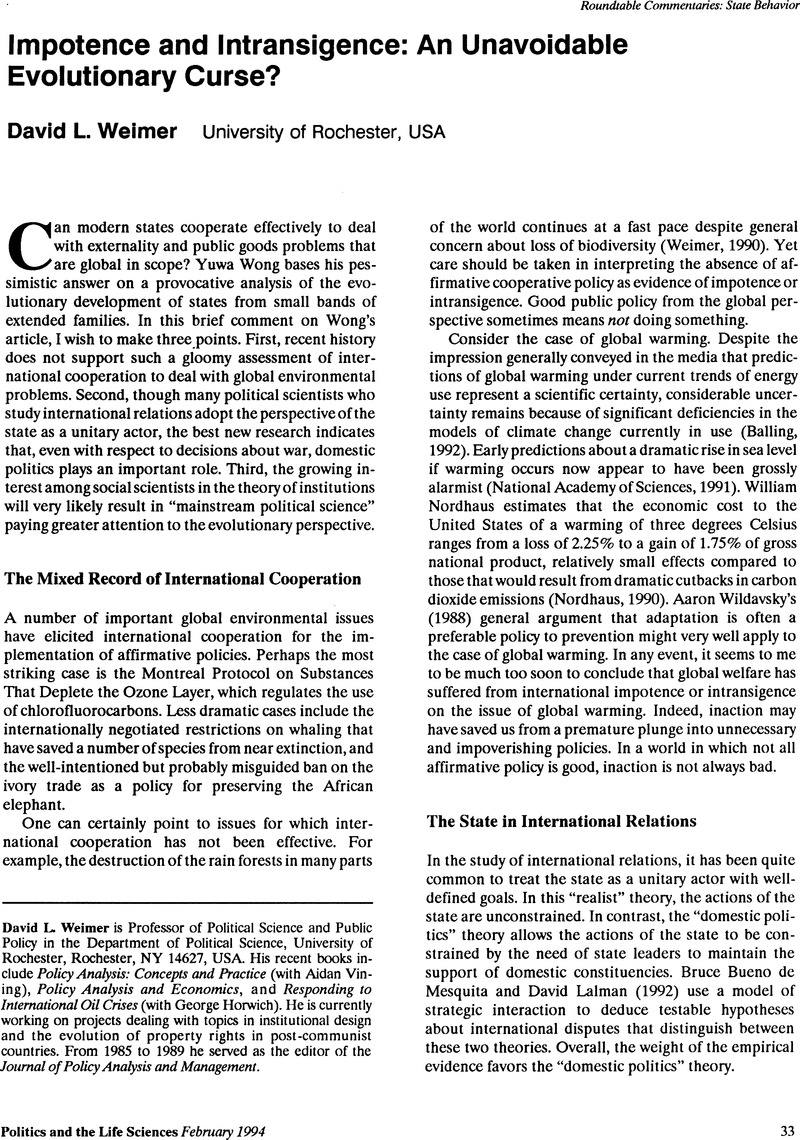No CrossRef data available.
Article contents
Impotence and Intransigence: An Unavoidable Evolutionary Curse?
Published online by Cambridge University Press: 17 May 2016
Abstract
An abstract is not available for this content so a preview has been provided. Please use the Get access link above for information on how to access this content.

- Type
- Roundtable Commentaries
- Information
- Copyright
- Copyright © Association for Politics and the Life Sciences
References
Axelrod, R. (1984). The Evolution of Cooperation. Chicago: University of Chicago Press.Google Scholar
Balling, R.C. Jr. (1992). The Heated Debate: Greenhouse Predictions Versus Climate Reality. San Francisco: Pacific Research Institute for Public Policy.Google Scholar
Bueno de Mesquita, B. and Lalman, D. (1992). War and Reason: Domestic and International Imperatives. New Haven, CT: Yale University Press.Google Scholar
Fudenberg, D. and Maskin, E. (1986). “The Folk Theorem in Repeated Games with Discounting or with Incomplete Information.” Econometrica 54:533–54.CrossRefGoogle Scholar
Knight, J. (1992). Institutions and Social Conflict. New York: Cambridge University Press.Google Scholar
March, J.G. and Olsen, J.P. (1989). Rediscovering Institutions: The Organizational Basis of Politics. New York: The Free Press.Google Scholar
National Academy of Sciences (1991). Policy Implications of Greenhouse Warming. Washington, DC: National Academy Press.Google Scholar
Nordhaus, W.D. (1990). “Slowing the Greenhouse Express: Economic Policy in the Face of Global Warming.” In Aaron, H. (ed.), Setting National Priorities. Washington, DC: Brookings Institution.Google Scholar
North, D.C. (1990). Institutions, Institutional Change, and Economic Performance. New York, NY: Cambridge University Press.Google Scholar
Schotter, A. (1981). The Economic Theory of Institutions. New York: Cambridge University Press.Google Scholar
Shepsle, K.A. (1979). “Institutional Arrangements and Equilibrium in Multidimensional Voting Models.” American Journal of Political Science 23:27–69.CrossRefGoogle Scholar
Sugden, R. (1986). The Economics of Rights, Co-operation and Welfare. New York: Basil Blackwell.Google Scholar
Weimer, D.L. (1990). “An Earmarked Fossil Fuel Tax to Save the Rain Forests.” Journal of Policy Analysis and Management 9:254–59.CrossRefGoogle Scholar




